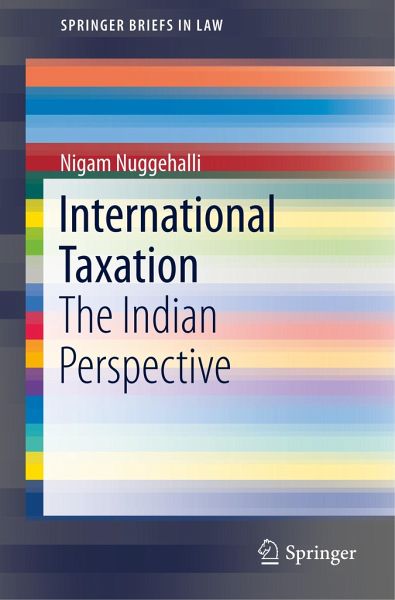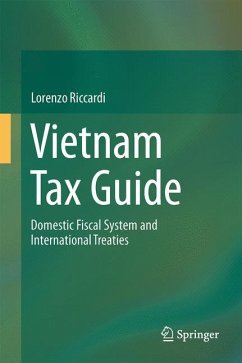
International Taxation
The Indian Perspective

PAYBACK Punkte
25 °P sammeln!
This book covers all major topics in international tax law, ranging from permanent establishments and capital gains to the taxation of royalties and technical services, transfer pricing, and General Anti-Avoidance Legislation. It also highlights the Indian "story" of status vs. contract by examining four areas of controversy: permanent establishments, FTS (Fees for Technical Services) & Royalty, capital gains, and transfer pricing. The book approaches the subject of international taxation from two opposing yet related perspectives. One is the tax planning perspective, which involves contracts ...
This book covers all major topics in international tax law, ranging from permanent establishments and capital gains to the taxation of royalties and technical services, transfer pricing, and General Anti-Avoidance Legislation. It also highlights the Indian "story" of status vs. contract by examining four areas of controversy: permanent establishments, FTS (Fees for Technical Services) & Royalty, capital gains, and transfer pricing. The book approaches the subject of international taxation from two opposing yet related perspectives. One is the tax planning perspective, which involves contracts entered into by individuals and companies; the other is that of state regulation through increasingly complex legislation.
The area of permanent establishments demonstrates the dominance of contracts over status, at least with respect to Indian tax law. However, some recent judicial decisions in this area demonstrate the susceptibility of contracts to status-related arguments. Theareas of FTS & Royalty as well as those of capital gains and transfer pricing demonstrate the Indian government's attempts to establish, through legislation, the dominance of status over contracts.
Whereas traditional textbooks on international tax law focus on the legal technicalities of tax legislation, this book provides tax scholars and lawyers with an understanding of tax planning and tax legislation side by side in each chapter, specifying the respective kind of actual or anticipated tax planning activity that in turn prompted a legislative response. As such, it offers readers a contextual and practical introduction to the complexities of international tax law, as well as an in-depth analysis of the latest debates and controversies in this area.
The area of permanent establishments demonstrates the dominance of contracts over status, at least with respect to Indian tax law. However, some recent judicial decisions in this area demonstrate the susceptibility of contracts to status-related arguments. Theareas of FTS & Royalty as well as those of capital gains and transfer pricing demonstrate the Indian government's attempts to establish, through legislation, the dominance of status over contracts.
Whereas traditional textbooks on international tax law focus on the legal technicalities of tax legislation, this book provides tax scholars and lawyers with an understanding of tax planning and tax legislation side by side in each chapter, specifying the respective kind of actual or anticipated tax planning activity that in turn prompted a legislative response. As such, it offers readers a contextual and practical introduction to the complexities of international tax law, as well as an in-depth analysis of the latest debates and controversies in this area.












